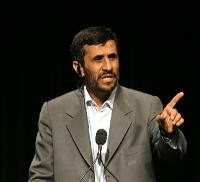When mass protests erupted in Iran following charges of fraud in last June's presidential election, Western leaders -- particularly U.S. President Barack Obama -- took pains not to taint those domestic disturbances with foreign fingerprints. To foreigners concerned about Iran's nuclear aspirations, the sight of muscular internal dissent suddenly presented new and intriguing thoughts: International opposition to the Iranian nuclear program is not the only problem faced by the ruling powers in the Islamic Republic.
The disturbances revealed one of Iran's great weaknesses: widespread discontent with a regime of questionable legitimacy. Now that the regime has suppressed the protests, however, the problem of internal dissent has not ended. As it turns out, Iran has another Achilles' Heel, one just as debilitating as its political rifts: its deep ethnic divisions, which represent a growing threat to the country's stability and the regime's hold on power.
The Revolutionary Guard has always known about this problem. But the potential destructiveness of ethnic challenges to the rule of Iran's Persian Shiites blasted to the forefront last Sunday, when a suicide bomber detonated himself and his deadly load in the Pishin district, near the border with Pakistan. The blast killed 42 people, including at least 15 members of the elite Revolutionary Guard, six of them senior commanders.

